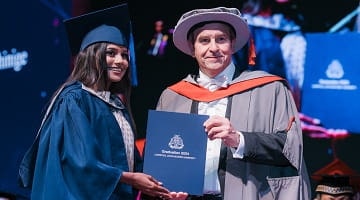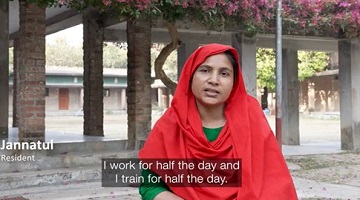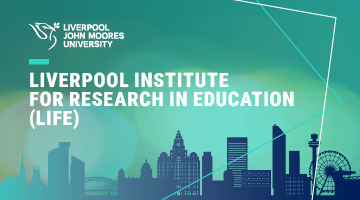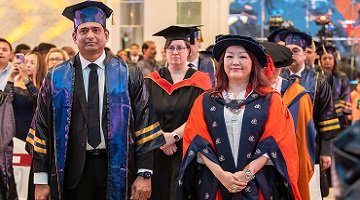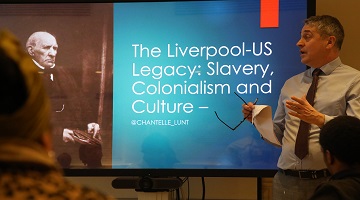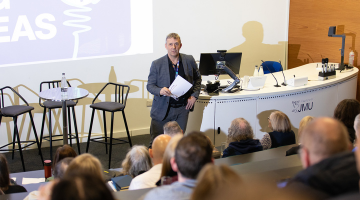Why study this course with LJMU?
- Our Initial Teacher Training partnership provision has been rated as Good by Ofsted in its most recent assessment
- 100% of students go on to work and / or study within 15 months after graduating
- You will be qualified to teach all subjects within the Primary National Curriculum as well as learning about the professional and legal responsibilities of being a teacher
- Hands-on teaching practice in primary schools across the North West region
- Training and mentoring from school teachers as well as University tutors
- 94% of students surveyed said the teaching staff on our education courses were good at explaining things (National Student Survey 2024)
About your course
The BA in Primary Education with Qualified Teacher Status (QTS) qualifies you to teach children aged 5-11
This course will extend both your subject knowledge as well as pedagogical knowledge in all curriculum areas in Key Stage 1 and Key Stage 2. Professional studies modules each year form the backbone of the course and prepare you for the academic and professional role of being a teacher.
There is a focus on the core curriculum - English and mathematics have individual modules each year, giving plenty of time to explore pedagogical and content knowledge of each subject. Science is taught through STEM modules and an individual module in year 3. The foundation subjects are taught as subjects in their own right, but cross curricular opportunities are also explored, to recognise the different way that schools develop a broad and balanced curriculum.
The course is delivered in partnership with our primary schools across in the North West, and will provide you with a rich range of teaching opportunities in each year including a total of 24 weeks full time placements so you will have plenty of hands-on practice and training, not only from academic tutors but also from the teachers you work with in schools. Your teaching placements will be in Key Stage One and Key Stage 2 classes every school will provide you with a mentor will always have the support of a mentor who oversees your school based training needs, with additional visits from a member of LJMU staff.
In year 1 you will have 6 weeks block placement. In addition to this you will be in school every Monday from late October which will give you a great opportunity to build your confidence and understanding of the Primary school and the role of the teacher.
In year 2 you will have an 8 week block placement with and then in year 3 your final placement will last for 12 weeks.
Further enrichment opportunities working with children come through modules, teaching phonics, planning mathematics trails, teaching foundation subjects and delivering a global project experience in schools. All these additional experiences are only possible due to the small relatively small cohort size and the excellent relationship we have with our local partnership schools.
In addition our course also gives the opportunity for some additional certificates - CEOPS training, P4C level 1, FA coaching and Forest school Level 1, carried out on site in our own forest school.
Course modules
What you will study on this degree
Further guidance on modules
Modules are designated core or optional in accordance with professional body requirements, as applicable, and LJMU’s Academic Framework Regulations. Whilst you are required to study core modules, optional modules provide you with an element of choice. Their availability may vary and will be subject to meeting minimum student numbers.
Where changes to modules are necessary these will be communicated as appropriate.
Core modules
Core modules
Optional Modules
Core modules
Professional accreditation/links
This course is provided in partnership with a number of primary schools in the North West region, ensuring that you experience a broad range of school settings when you embark on your teaching practice placements.
Once you successfully complete your course, you will be recommended for Qualified Teacher Status (QTS).
Your Learning Experience
Excellent facilities and learning resources
We adopt an active blended learning approach, meaning you will experience a combination of face-to-face and online learning during your time at LJMU. This enables you to experience a rich and diverse learning experience and engage fully with your studies. Our approach ensures that you can easily access support from your personal tutor, either by meeting them on-campus or via a video call to suit your needs.
Teaching on the course is via a combination of lectures, seminars, online activities, tutorials, workshops, use of ICT, school experience and independent learning.
Work-related Learning
Hands-on teaching practice is a vital element of this course and so you will be given plenty of opportunities to work with children in a variety of primary school settings in the North West region. This gives you a chance to put into practice what you have learnt during the course, develop your teaching technique and experience the rewards as well as the challenges of teaching young children.
In the most recent OFSTED report, its inspectors made frequent reference to the strength of the partnerships with schools – including our 10 school-led partners and hundreds of other local and regional primary and secondary schools where students undertake professional practice placements. Meaningful partnership, they said, enabled trainees to be high-achieving both in quality and aspiration.
Dedicated personal tutor, plus study skills support
From the moment you join LJMU, you will be assigned a personal tutor who will be responsible for your academic and personal progress throughout the course. Support during teaching practice is particularly important and so in addition to mentoring from one of the teachers, you will have visits from a university liaison tutor to monitor progress and observe your teaching.
Library Services teams also offer a fantastic range of support and guidance services, including online help guides, online chat facility and on-site help.
Our dedicated Student Advice and Wellbeing (SAW) team provide a wide range of services including accommodation advice, disability support, counselling and money matters information.
Assessment varies depending on the modules you choose, but will usually include a combination of exams and coursework.
We recognise that all students perform differently depending on how they are assessed, and so we use a variety of assessment methods including coursework, assessed teaching sessions, group presentations individual presentations and some examinations.
Constructive feedback is important in helping you to identify your strengths as well as areas that may need further attention, so this will be provided regularly as you progress through each module and following teaching practice.
Where you will study
Based in the Education Building in the heart of the Mount Pleasant campus, the School of Education features a wide range of cutting-edge facilities, including a pedagogy room, lecture rooms, computing facilities and a nearby Forest School for outdoor learning. Students also benefit from independent study spaces, a close-by cafeteria and library, and access to student welfare and support.
Course tutors

Sarah Hindhaugh
Programme leader
Our team of practitioners, specialist academics and support staff are dedicated to ensure you reach your full potential and become the best possible Primary teachers receive a first-class education whilst studying at LJMU.
Our team of practitioners, specialist academics and support staff are dedicated to ensure you reach your full potential and become the best possible Primary teachers receive a first-class education whilst studying at LJMU.
Career paths
Our primary education students enjoy outstanding career prospects.
There are also excellent opportunities if you want to take on extra curriculum and management responsibilities or if you want to focus exclusively on effective classroom practice.
We also offer an excellent range of postgraduate qualifications, including mandatory qualifications for teaching in specialist areas:
Student Futures - Careers, Employability and Enterprise Service
A wide range of opportunities and support is available to you, within and beyond your course, to ensure our students experience a transformation in their career trajectory. Every undergraduate curriculum includes Future Focus during Level 4, an e-learning resource and workshop designed to help you to develop your talents, passion and purpose.
Every student has access to Careers Zone 24/7, LJMU's suite of online Apps, resources and jobs board via the LJMU Student Futures website.
Tuition fees and funding
- Full-time per year:
- £9,535
The University reserves the right to increase tuition fees in accordance with any changes to the maximum allowable fees set by the UK Parliament. In the event of such a change, any fee increase will be subject to a maximum cap of 10% of the total course cost as originally stated at the time of your offer.
The fees quoted above cover registration, tuition, supervision, assessment and examinations as well as:
- library membership with access to printed, multimedia and digital resources
- access to programme-appropriate software
- library and student IT support
- free on-campus wifi via eduroam
Additional costs
Although not all of the following are compulsory/relevant, you should keep in mind the costs of:
- accommodation and living expenditure
- books (should you wish to have your own copies)
- printing, photocopying and stationery
- PC/laptop (should you prefer to purchase your own for independent study and online learning activities)
- mobile phone/tablet (to access online services)
- field trips (travel and activity costs)
- placements (travel expenses and living costs)
- student visas (international students only)
- study abroad opportunities (travel costs, accommodation, visas and immunisations)
- academic conferences (travel costs)
- professional-body membership
- graduation (gown hire etc)
Funding
There are many ways to fund study for home and international students. From loans to International Scholarships and subject-specific funding, you'll find all of the information you need on our specialist funding pages.
Entry requirements
Please choose your qualifications below to view requirements
Grades/points required from qualifications: BBB - ABB (120 - 128)
Work out how many UCAS points your qualifications are worth by visiting the UCAS Tariff Calculator.
Qualification requirements
How to apply
Securing your place at LJMU
UCAS is the official application route for our full-time undergraduate courses. Further information on the UCAS application process can be found here https://www.ljmu.ac.uk/study/undergraduate-students/how-to-apply.
Your university life
From accommodation and academic support to clubs and societies. Find out what LJMU has to offer.
Related Links
Talk to our students
Connect with a current LJMU student for advice and guidance on university life, courses and more.
See what our students are saying
At LJMU we want you to know you're making the right choice by studying with us. You can see what our students are saying about their experience with us through their reviews on the following websites:
Related Links
News and views
Browse through the latest news and stories from the university
The university reserves the right to withdraw or make alterations to a course and facilities if necessary; this may be because such changes are deemed to be beneficial to students, are minor in nature and unlikely to impact negatively upon students or become necessary due to circumstances beyond the control of the university. Where this does happen, the university operates a policy of consultation, advice and support to all enrolled students affected by the proposed change to their course or module.
Further information on the terms and conditions of any offer made, our admissions policy and the complaints and appeals process.























